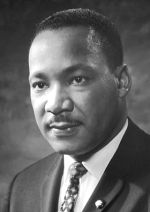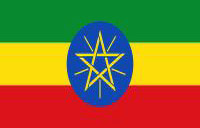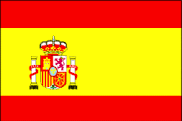
Martin Luther King Jr.
The Nobel Peace Prize 1964
Award: The Nobel Peace Prize 1964 was awarded to Martin Luther King Jr."
Martin Luther King Jr. – A Trinity of Foundational Values
By Victoria Barrientos, BA (English), Summa Cum Laude, Content Writer
June 5, 2024
"I too am compelled to carry the gospel of freedom beyond my particular hometown. Like Paul, I must constantly respond to the Macedonian call for aid.”1 These willful words featured in “Letter From Birmingham Jail" present Martin Luther King Jr's religious and philosophical grit he attained from a young age. He became a social activist, minister, and philosopher through core foundational values learned from his youth. Born on January 15, 1929, in Atlanta Georgia, slavery had already been abolished, yet the "separate but equal" doctrine cemented segregation as the nation's normality. Since his childhood, King questioned the legitimacy of unjust laws and criticized complacency to the status quo. He grew to develop his own ideas and philosophies through his Christian background, theology education, and philosophical quests to become a leader at the height of the modern civil rights era. King's ideologies were influential to his activism and set a foundation for ushering in nonviolent change. His traditional principles of love, education, and Christianity influenced his peaceful approach to advancing civil rights and social justice, leaving a lasting impact on American society and the world.
King was born during the Great Depression. Though he entered the world during challenging times he credits his optimistic view of life to being raised in a love-filled household. In his autobiography, The Autobiography of Martin Luther King, Jr. he revealed,
"It is quite easy for me to think of a God of love mainly because I grew up in a family where love was central and where lovely relationships were ever present. It is quite easy for me to think of the universe as basically friendly mainly because of my uplifting hereditary and environmental circumstances. It is quite easy for me to lean more toward optimism than pessimism about human nature mainly because of my childhood experiences."2
King attributes love as a virtue that molded him into the devoted man he grew up to become. Although loving, he described his parents as opposites, Alberta a gentle mother and Martin Sr a strong-willed father. 3 His mother's quiet confidence instilled self-respect in King as she taught a clear distinction of segregation as, "...a social condition rather than a natural order."4 His mother affirming that he is just as capable in life as anyone else deterred insecurity from settling into his young mind. His father demonstrated courage and leadership in his community. He was president of the NAACP, a pastor, and would verbally defend himself in the face of discrimination.5 His father instilled the power of oracular skills that would lead King to eventually become an influential speaker. King’s parents' opposite characteristics instilled a dynamic combination within him that later emerged as a fighter for love.
Education is another virtue that flourished within King's family line. His maternal grandfather and father attended Morehouse College and King followed at age 15, having skipped eleventh and twelfth grades.6 King spent his adolescent years in a liberal academic atmosphere that encouraged black students to innovate positive solutions to racial inequality. He would eventually come across Henry David Thoreau's essay "On Civil Disobedience" which details David’s choice to be jailed instead of paying taxes and further supporting war.7 This important discovery sparked a new vision and way forward in the plight toward racial freedom. King stated in his autobiography, "I became convinced that noncooperation with evil is as much a moral obligation as is cooperation with good."8 His vision to reject conflict with peace would be reflected in various nonviolent protests and boycotts throughout the civil rights movement.
Through college education, King experienced a paradigm shift from fundamentalism to intellectualism. Religion had been a foundation that set an example of radical religious figures to live by as his grandfather and father were preachers. However, King mentioned in his autobiography that the more he noticed how disconnected untrained seminaries were to modern thinking the less connected he felt to Christianity.9 He bridged a gap between both ideologies by taking a bible course. The course led him to integrate the moral teachings of biblical myth into an intellectual understanding. Inevitably he entered ministry after realizing that his father and professors, whom he looked up to, were both intellectual and religious.10 King did not give up on his religious foundation, he made the effort to develop a deeper understanding of it which contributed to a more purposeful spirit in his activism. He not only recognized the power of his own religious teachings but of the spiritual and philosophical teachings of other lands.
Philosophy inspired King in his pursuit towards peace, particularly Mahatma Gandhi's method of nonviolent resistance. On December 1st, 1955 Rosa Parks, secretary of the NAACP, refused to give up her bus seat for a white passenger and was arrested.11 King and members of the church communities discussed the idea of boycotting bus transportation which the community executed successfully. Residents noted how the Montgomery Movement mirrored Gandhi's non-violent movement in India and quickly gained track in the black community.,12 It became a debate of whether his technique was too meek. Yet King believed in its quiet power. He admired it so much that he made the pilgrimage to India to connect with the leaders of non-violent social change. He learned about the Bhoodanists whose efforts to co-own land with the wealthy provided these villagers the opportunity to trade and barter and live self-sufficiently.13 He met with Ghandi’s descendants and followers who welcomed him with open arms. He left India with an optimistic view of the United States future based on the spirit of redemption in India following its independence.
Since his pilgrimage, King was arrested various times for his protests and sit-in participation. However, he maintained his learning of self-sacrifice and non-violent resistance he learned in India. During the 1960 lunch counter sit-ins across black colleges for the integration of lunch counters, participants were met with police brutality and imprisonment14. King was among the hundreds arrested and refused to post bail.15 The following year The Albany Movement emerged resulting in the most non-violent efforts to end segregation King had experienced. He was jailed with hundreds more protesters than his previous imprisonment. Amidst the turmoil, King took note of the unity and disintegration of social stratification among the protesters when it came to their fight for freedom, "Out from the jails came those men and women doctors, ministers, housewives - all of whom had joined ranks with a gallant student leadership in an exemplary demonstration of nonviolent resistance to segregation."16 The momentum of mass protests carried on in Birmingham, Alabama. King and numerous leaders planned the Birmingham Campaign to dismantle the most segregated city in the country through sit-ins and marches that went further than had ever been permitted. Self-sacrifice was already the norm for King and the black community and he was fully prepared for arrest. However, this time King was thrown into solitary confinement where he wrote "Letter From Birmingham Jail."
"Letter From Birmingham Jail" counter-argued "A Call for Unity" which reasoned against civil rights demonstrations. King called for direct action for necessary change to occur. King's letter showcased his virtues of love, knowledge and religion that had been instilled in him since childhood. He was adept at analyzing and critiquing hypocritical democratic structures. "...there are some counties without a single Negro registered to vote, despite the fact that the Negroes constitute a majority of the population. Can any law set up in such a state be considered democratically structured?"17 He was aware enough to caution that such an imbalanced society develops a degraded society. Yet society labeled King as the problem, specifically an extremist. Through his optimistic mindset, he was able to take his power back and identify himself as an extremist for love, "I gradually gained a bit of satisfaction from being considered an extremist. Was not Jesus an extremist in love? -- "Love your enemies, bless them that curse you, pray for them that despitefully use you."18 King would naturally represent religious figures as the church was an integral force of his activism. Before Gandhi's philosophy spread Jesus was an example of non-violent resistance from which the community learned. He paid homage to the black church by revealing, "I'm grateful to God that, through the Negro church, the dimension of nonviolence entered our struggle. If this philosophy had not emerged, I am convinced that by now many streets of the South would be flowing with floods of blood."19 King’s letter showcased that his intelligence and passion for love and religion cultivated a fitting strategy to fight segregation.
The traditional values that influenced King also led him to become a man of the ages. His value for education led him to a philosophy that popularized peaceful protests in the US. King’s instilled passion for love and religion solidified his mission through its unifying effects.
There were many that disliked King and his viewpoints yet he was influential enough to change society. King's Nobel Peace Prize of 1964, monuments and memorials in his name, and a federal holiday in his honor speak of his enduring global impact.
Notes
- The Negro Is Your Brother. (1963). The Atlantic Monthly, 212(2). https://www.csuchico.edu/iege/_assets/documents/susi-letter-from-birmingham-jail.pdf
- "Chapter 1: Early Years." n.d. The Martin Luther King, Jr. Research and Education Institute. https://kinginstitute.stanford.edu/publications/autobiography-martin-luther-king-jr/chapter-1-early-years.
- "Chapter 1: Early Years." n.d. The Martin Luther King, Jr. Research and Education Institute.
- "Chapter 1: Early Years." n.d. The Martin Luther King, Jr. Research and Education Institute.
- "Chapter 1: Early Years." n.d. The Martin Luther King, Jr. Research and Education Institute.
- "Chapter 2: Morehouse College." n.d. The Martin Luther King, Jr. Research and Education Institute. https://kinginstitute.stanford.edu/publications/autobiography-martin-luther-king-jr/chapter-2-morehouse-college.
- "Chapter 2: Morehouse College." n.d. The Martin Luther King, Jr. Research and Education Institute.
- "Chapter 2: Morehouse College." n.d. The Martin Luther King, Jr. Research and Education Institute.
- "Chapter 2: Morehouse College." n.d. The Martin Luther King, Jr. Research and Education Institute.
- "Chapter 2: Morehouse College." n.d. The Martin Luther King, Jr. Research and Education Institute.
- "Chapter 7: Montgomery Movement Begins.” n.d. The Martin Luther King, Jr. Research and Education Institute. https://kinginstitute.stanford.edu/publications/autobiography-martin-luther-king-jr/chapter-7-montgomery-movement-begins.
- "Chapter 8: The Violence of Desperate Men.” n.d. The Martin Luther King, Jr. Research and Education Institute. https://kinginstitute.stanford.edu/publications/autobiography-martin-luther-king-jr/chapter-8-violence-desperate-men.
- "Chapter 13: Pilgrimage to Nonviolence.” n.d. The Martin Luther King, Jr. Research and Education Institute. https://kinginstitute.stanford.edu/publications/autobiography-martin-luther-king-jr/chapter-13-pilgrimage-nonviolence.
- "Chapter 15: Atlanta Arrest and Presidential Politics." n.d. The Martin Luther King, Jr. Research and Education Institute. https://kinginstitute.stanford.edu/publications/autobiography-martin-luther-king-jr/chapter-15-atlanta-arrest-and-presidential.
- "Chapter 15: Atlanta Arrest and Presidential Politics." n.d. The Martin Luther King, Jr. Research and Education Institute.
- "Chapter 16: The Albany Movement." n.d. The Martin Luther King, Jr. Research and Education Institute. https://kinginstitute.stanford.edu/publications/autobiography-martin-luther-king-jr/chapter-16-albany-movement.
- The Negro Is Your Brother. (1963). The Atlantic Monthly, 212(2).
- The Negro Is Your Brother. (1963). The Atlantic Monthly, 212(2).
- The Negro Is Your Brother. (1963). The Atlantic Monthly, 212(2).
Bibliography
"Autobiography of Martin Luther King Jr." n.d. The Martin Luther King, Jr. Research and Education Institute. https://kinginstitute.stanford.edu/publications/autobiography-martin-luther-king-jr.King, Martin Luther, Jr. 2022. "The Negro Is Your Brother." The Atlantic, May 28, 2022. https://www.theatlantic.com/magazine/archive/1963/08/the-negro-is-your-brother/658583/.

Wikipedia
Name: Martin Luther King
Birth: 15 January 1929, Atlanta, GA, USA
Death: 4 April 1968, Memphis, TN, USA
Residence when prize awarded: USA
Award: Leader of "Southern Christian Leadership Conference
Portion of Cash: 1/1
Medal, Cash, Philanthropy
Drawing
King Essay
Discover Your Abilities and Aspirations!
 $10 $25 $50 $100 Other
$10 $25 $50 $100 Other
Tax Exempt 501(c)3 Non-Profit Organization
Any Currency
“…the peace that is found in libraries and laboratories…” - Louis Pasteur
Copyright © 2023 Ganga Library Inc. All Rights reserved.;













